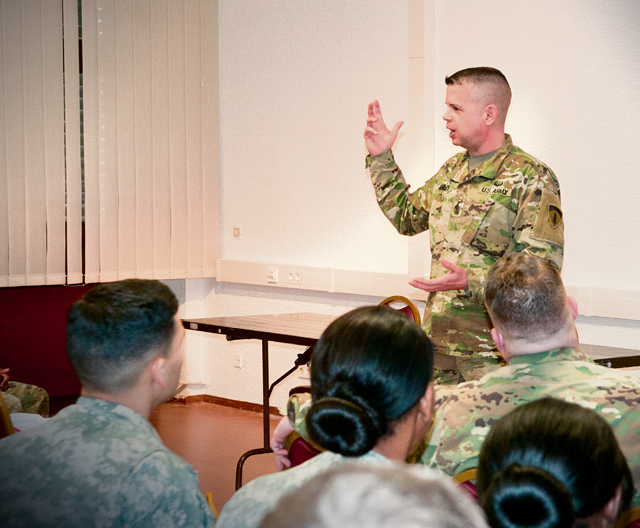
Chaplains and chaplain assistants from throughout the 21st Theater Sustainment Command and the U.S. Army Garrison Rheinland-Pfalz gathered at Daenner Kaserne for the U.S. Army Europe Chaplaincy Annual Sustainment Training Lite-Europe symposium March 1 and 2.
The CASTLE symposium offers professionals in the chaplaincy the opportunity to receive training and professional development in a number of areas critical to their calling, including ministering to soldiers, counseling soldiers and advising commanders.
Various key leaders engaged with the attendees, which included primarily brigade- and battalion-level chaplains and their assistants. In addition to key leader and subject matter expert presentations, the forum also included open discussion sessions in which attendees were afforded the opportunity to speak openly and frankly about challenges facing them both in their faith and professionally as service members.
Each CASTLE symposium is centered around a particular subject within the profession of the Army chaplaincy, and this session was focused on the sometimes challenging balance between a chaplain’s calling as a servant of faith and a chaplain’s duty as a servant of soldiers in a fast-paced, multicultural community like the U.S. Army.
“This CASTLE is focused on ‘identity,’” said Chaplain (Col.) Jonathan Shaw, the USAREUR command chaplain, who organized the event. “We’re trying to answer the question: What does it mean to be a religious supporter who is also serving in the profession of arms? Strengthening servant identity is foundational for all we do, serving God, the nation, and soldiers, families, and civilians.”
Chaplains play a unique role in the military and, in addition to their commissioning in the military, are ordained and formally recognized by their various faith organizations. This means that they essentially need two broad skillsets, according to Shaw, to navigate challenges and serve effectively in the military. They need clergy skills to minister and professional military skills to lead, inspire, and advise. Sustaining those skills is exactly what this symposium is meant to do.
“We do this to sustain the individual, so they can go back and sustain their units,” Shaw said. “By gathering to do this in person together, we are building the human team. People are building confidence by hearing from other people on the team about ways of dealing with these difficult challenges.”


